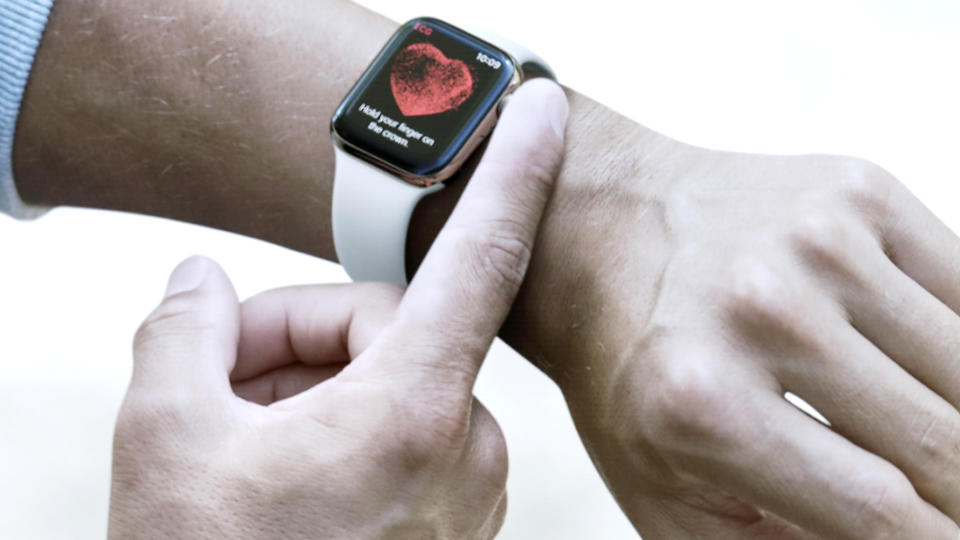Can the new Apple Watch save your life?
The new Apple Watch lets you do more than just check the time, take calls, and glance at your jam-packed calendar.
The Series 4, which is highly focused on users’ fitness and health, comes with a built-in electrical heart sensor that can take an electrocardiogram (ECG), detect atrial fibrillation (an irregular heartbeat), and notify you when your heart rate gets low or high. The readings are recorded in the iPhone’s Health app and can be shared with your doctor.
Some doctors, including Ivor Benjamin, MD, the president of the American Heart Association (AHA), who spoke at the event when Apple announced its new products on Sept. 12, are excited about the watch’s heart health technology.

“I’m inspired by the lifesaving potential of technology and applaud Apple’s innovation and commitment to health,” Benjamin said at Wednesday’s event. “Capturing meaningful data about a person’s heart, in real time, is changing the way we practice medicine.”
Benjamin noted that, in his experience, people often share health issues they’ve experienced with their physicians, but these symptoms aren’t always present at the time of the doctor’s visit — something the Apple Watch could help change.
“The ability to access health data from an on-demand electrocardiogram or ECG is game-changing, especially when evaluating atrial fibrillation — an irregular and often rapid heart rate that can increase a person’s risk of stroke, heart failure, and other heart-related complications,” he said.
He added: “Products that seek to provide deeper health insights, like the Apple Watch Series 4, offer great potential in getting us there.”
The AHA also gave Yahoo Lifestyle a comment from its CEO, Nancy Brown:
“The role that technology plays in allowing patients to capture meaningful data about what’s happening with their heart, right when it’s happening, like the functionality of an on-demand ECG, could be significant in new clinical care models and shared decision making between people and their healthcare providers. At the American Heart Association, we are committed to educate and empower people to be proactive in all areas of their heart health and general well-being.”
Nicholas Leeper, MD, a cardiologist at Stanford Health Care, also thinks the technology is an exciting advancement, particularly for people who have arrhythmias but don’t know it. “This is potentially important because some of the arrhythmias that they may be able to identify, such as atrial fibrillation, can have devastating consequences, such as stroke, if not identified and addressed with medical therapy,” he tells Yahoo Lifestyle. “Because very often patients with atrial fibrillation can’t feel the arrhythmia — but are nonetheless at high risk for stroke — there is a strong theoretical argument for using the watch to identify ‘occult’ [hidden] disease in people who don’t know they have it, and institute medicines proven to reduce risk of subsequent stroke even if they don’t have symptoms.”
But there’s a question about whether widespread access to these medical tools actually translates into any significant health benefits.
A 2013 Journal of the American Medical Association study looked at whether echocardiographic screening in the general population improves long-term survival or reduces the risk of cardiovascular disease. In a nutshell, the study found that it didn’t. “Echocardiographic screening for structural and valvular heart disease in the general population provided no benefit for mortality or for the risk of myocardial infarction [heart attack] or stroke,” wrote the study authors.
The other problem, as Leeper points out, is that not all arrhythmias are created equal. “Some can be life-threatening; some are likely only a nuisance,” he says. “For example, we know that many, if not most, ‘healthy’ individuals will have at least some brief runs of arrhythmia if you really look for it. And we sometimes don’t know how those individuals should be treated, or if they should be treated at all.”
That can lead to both anxiety and unnecessary testing. “I suspect the new Apple watch may lead to a major increase in ‘incidentally detected’ arrhythmias of unclear significance, as well as a number of so-called ‘false positive’ diagnoses,” Leeper says. “While the new watch will almost certainly identify some individuals with life-threatening arrhythmias that otherwise would be missed, time will tell if that benefit is outweighed by the huge increase in potential ‘false positives’ that we expect to see in the clinic.”
While it comes with some challenges, like the potential for false positives, a 2018 study by researchers from the Netherlands and Germany suggests that widespread screening for atrial fibrillation, which affects 2.7 million Americans, may not be a bad idea. The study stated that large-scale atrial fibrillation screenings are “considered a desirable approach for the treatment and prevention of cardioembolic stroke” brought on by the condition and that, in general, handheld ECG devices are “promising.”
So Apple may be onto something, after all. At the very least, the new Apple Watch can make you — well, your wallet — $399 lighter.
Read more from Yahoo Lifestyle:
Follow us on Instagram, Facebook, and Twitter for nonstop inspiration delivered fresh to your feed, every day.


